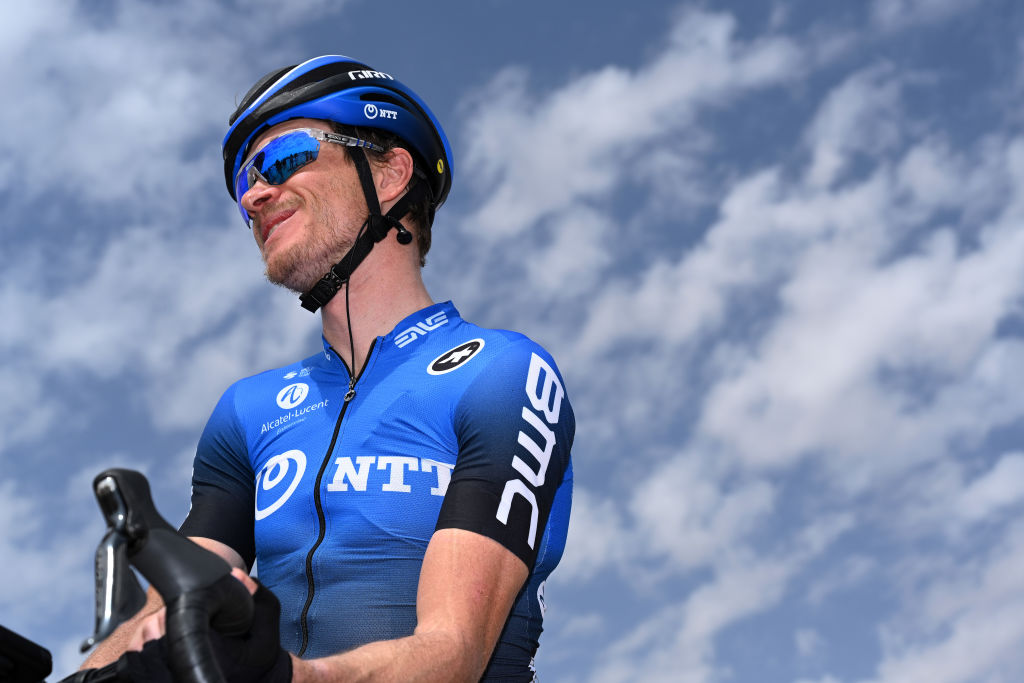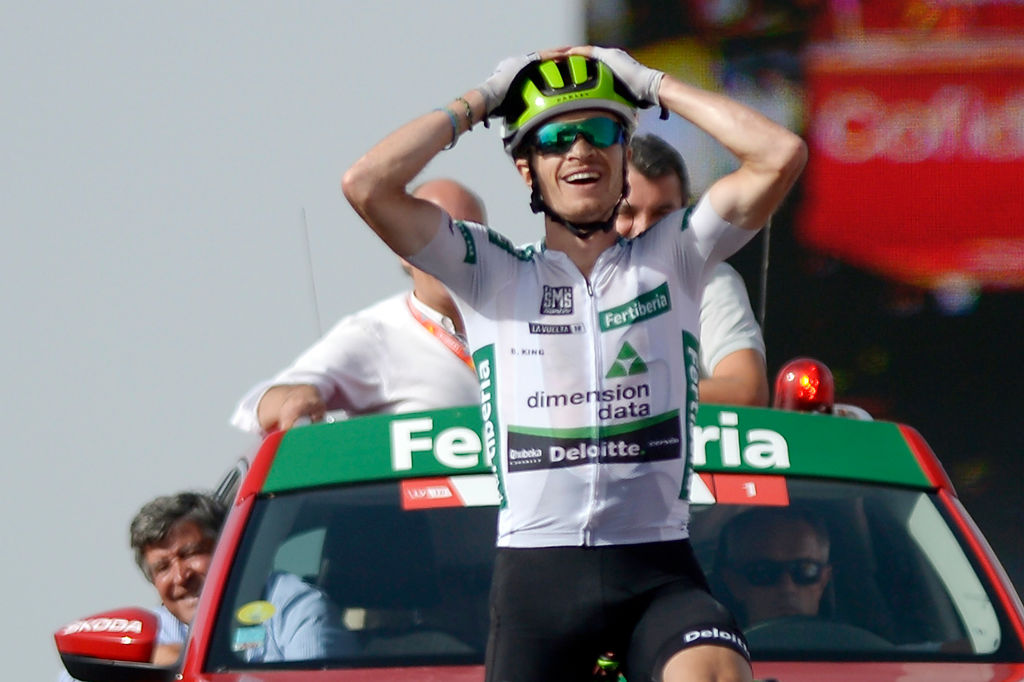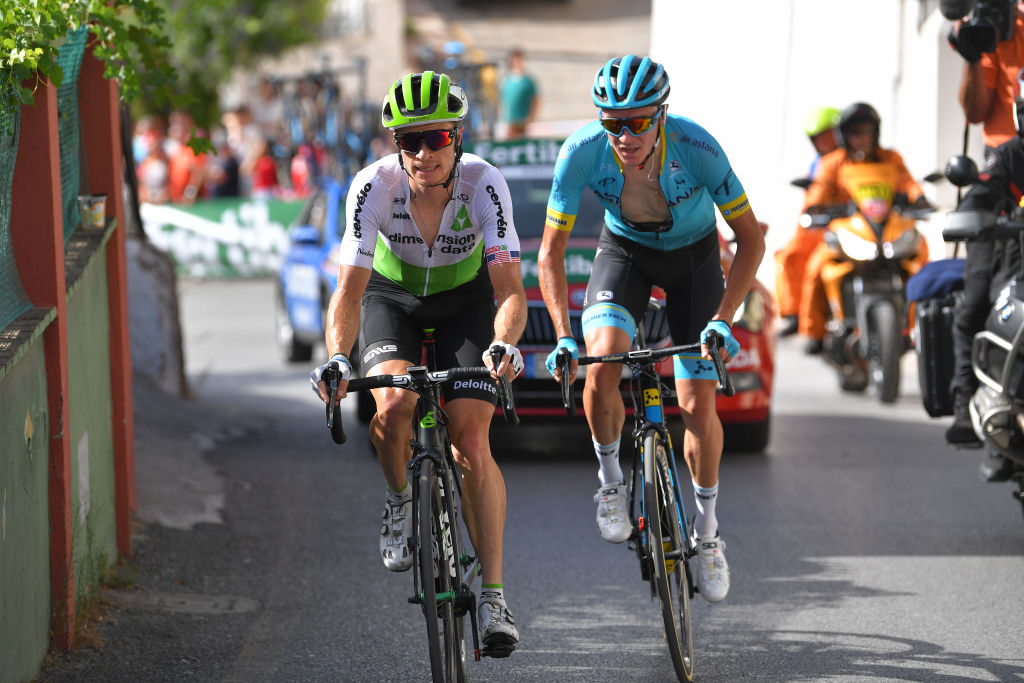Ben King: Balancing act
American NTT rider on juggling impending fatherhood, being in a contract year and trying to get to the Olympics

2020 has been a year of high anxiety for most of the world but for Ben King (NTT Pro Cycling) there is extra pressure as he balances impending fatherhood, being in a contract year during the coronavirus pandemic on a team with new management, watching his home state torn apart by racial tensions, all while trying to reverse USA Cycling's decision to leave him off the Olympic Games long team.
Now back in Lucca, Italy ahead of his team's first camp since the COVID-19 pandemic screeched his season to a stop, King is aiming for some of the form and fortune that led to his double stage wins in the 2018 Vuelta a España.
King tells Cyclingnews that his season will begin at the Tour de Pologne, and he is hoping to be selected for NTT's Tour de France team before returning to the Vuelta a España to add to his tally of stage wins there. A caveat: his partner Jenna is pregnant with their first child and due in mid-October.
"It's really exciting but also kind of stressful right now, with all of the travelling and planning. She's here now, but she has to have a baby in America. So she's going fly back in August," King says. "We planned it perfectly for the beginning of the [normal] offseason and now it's coming in the Giro."
The UCI's revised 2020 road calendar has pushed the start of the Vuelta to October 20 and his racing schedule would give him a window of one week to fly home to welcome the baby and then head to the Vuelta. "It's tight but it's possible that I could be there for the birth, which is something that I don't want to miss. But I also want to keep my job."
King has been with the team for four seasons and coming to the end of his contract. He had a strong start to the year with a top 10 in a cold and rainy Faun-Ardèche Classic after being in the breakaway with Deceuninck-Quickstep's Rémi Cavagna. He admits to feeling some anxiety about being out of contract but not stressed.
"I feel anxious about it sometimes but I've been in this situation a lot of times, late in the season without a contract. And I just have to trust that if this is where I'm supposed to be that it'll work out and I know that I'm doing everything I possibly can to ensure that.
Get The Leadout Newsletter
The latest race content, interviews, features, reviews and expert buying guides, direct to your inbox!
"My season started well, I had a top ten in my last race. So that's good, but then there's a lot of pressure riding on the next three months. You don't have time to recover if something goes wrong at the start... I think the teams acknowledge that. I really feel for the under-23 guys. Even if I don't have a great year I have 10 other years in the WorldTour and few victories to point to. And those guys can only just send in a bunch of power files. That's about all they have to show for 2020."
King says the team has been good about keeping in touch during the pandemic – using sponsor Alcatel-Lucent's Rainbow platform – which has helped to keep the riders connected. But King has yet to meet the team's new owners, including the team's new manager Bjarne Riis.
"Unfortunately it was on our schedules to be at Tirreno Adriatico together, but that was one of the first races to get cancelled. So I have yet to meet him, which is also really weird on a contract year – it's just weird to be part of this organization and to not even have had a personal connection with one of the top bosses. So I'm looking forward to that at the team camp.
"I think that the management and the leadership of the team have done a really good job of keeping us connected, keeping us motivated, giving us structure and giving us goals and targets and reasons to continue working hard."
Protests, diversity and NTT

Back in Virginia, King's hometown Richmond, and Charlottesville, near where he lives, have been the centre of mass protests, some violent, as part of the Black Lives Matter movement protesting against police brutality, and debates over the removal of confederate statues. King says he steered clear of town to avoid coronavirus risks, but he says he has "strong feelings" about the situation.
"The violence is obviously upsetting. Richmond was hit very hard – people who've worked for their entire lives to create a business have lost everything – bike shops were looted and all the customers' bikes were stolen. Their insurance doesn't cover vandalism," he says, but he agrees
"Black lives matter – I understand that point, and I understand people's frustration with experiencing racism. It breaks my heart – I have witnessed it secondhand because I ride for the first team in professional cycling that has normalized black athletes at the top level."
He said part of the reason he joined NTT back when it was known as Dimension Data was because of the diversity of the team and how it created a welcoming atmosphere for both the Europeans and the African riders. King believes the team has helped the pro peloton become more accepting of black riders.
"The team has helped the peloton to shift its thinking. This sport is evolving and has evolved. I truly believe that, because I have seen racist behaviour from other riders directed towards my teammates and it's upsetting.
"We are the first ones to come to their defence and you know, they've always turned the other cheek and let their legs do the talking, which is admirable but you know the rest of us – even guys on other teams – it's not something is accepted. It's something that exists but it's not tolerated by the majority of the riders here. It's really sad that these guys have to deal with that in their career.
"Cycling is a predominantly European sport, and there aren't even a lot of Americans in the sport. We're different from the majority of cyclists. If you look at me, you might think I'm Belgian until you hear me talk but people see these riders' black skin and then it's very obvious but they're different. Our Black riders are some of our strongest teammates. I would put money on Amanuel Ghebreigzabhier to win a stage in the Giro d'Italia this year. He's flying."
King points to the success of NTT's development programme as a key to the success of African riders and hopes that grassroots organisations in the US can help to shift more talent into cycling, which could increase the diversity.
"Cycling is a different sport for Americans to get into and I hope that changes. I think that organizations like NICA (National Interscholastic Cycling Association) are doing a great job and addressing that and making cycling the cool sport that the 'jocks' want to play. Hopefully, we'll start to attract some of the best athletes that the US has to offer."
Like many of his fellow US pros, King runs a fundraiser in the offseason - last year his Home Roads event raised money for Qhubeka, the team's charity partner - but this year he plans to benefit the Richmond Cycling Corps, an inner-city program that uses cycling to help at-risk kids stay in school.
"We're still ironing out the details for Ride Home Roads 2020 but it will take place during the Tour de France and focus on getting people to get active, ride their local roads while raising money and awareness for a charity of your choice."
Tokyo Olympics long team snub

Also like most of his fellow US pros, King had his sights on the 2020 Olympic Games in Tokyo, which were postponed until 2021. The US qualified only two spots for the Games but it was still strange that King, who won two stages of the Vuelta, is a former national champion and has won stages in the Critérium du Dauphiné and Tour of California, didn't make the long team.
"To be blunt, yeah, I was really surprised. The fact that you know Chad Haga [winner of a stage in the 2019 Giro d'Italia – Ed.] and myself were not on the list was a little bit surprising to me. I think one of their starting points was UCI points," King says, highlighting the number one conundrum for American pros.
"My role in the team is a support rider – not to finish 35th and get 10 UCI points. It's probably equally important that I only did Grand Tours and Classics last year. I didn't have any opportunity to score points and lower-level races, and I think the same goes for Chad Haga."
USA Cycling gives automatic spots to national champions, but it isn't always simple to slot in trans-Atlantic travel just before the Tour de France, which both King and Haga raced last year.
"It's not that we don't want to race nationals. It's just that we're being paid by our trade teams, and we're required to race on their schedule and as the only Americans on each of our teams, that that means that we're in Europe and we can't just fly back to America for Nationals before the Tour de France.
"I don't want to be a poor sport about it. We didn't make it an obvious enough decision for them, but if I'm honest I would have expected to be included. What I can do from now is do my best to show that I do deserve to be on the long-team."
King had been improving his time trial position over the winter, expecting that because the Olympic slots are for both the road race and time trial, it would be important to show his skills against the clock.
"The last time that I gave a hundred per cent in a time trial was the 2016 National Championships where I was second to [Andrew] Talansky. Other than that, I haven't put any effort into time trialling which except this year. I spent some time on the velodrome to improve my position and was looking forward to seeing how it went because I've been a national TT champion and I have had good time trials in the past."
Breakaway artist

King's other option to prove himself to the national team coach is to nab another stage in a Grand Tour, and there is no better way than from a breakaway for King. All of his best results have come from seemingly foolhardy escapes – his 2010 national championship solo attack was almost 100km long – but getting into just the right group, attacking at the right time and then being able to win takes luck, persistence and great form.
"There are a lot of tactics to, first getting in the breakaway and then and then being able to win from the breakaway especially if you're not the strongest rider in the breakaway. I've had some incredible mentors that I have been teammates with throughout the years to learn from – like Jens Voigt and Steve Cummings. I was roommates with both of those guys in most of the races we did together. I did my best to listen and learn and observe."
King's first Grand Tour stage came in the first week of the 2018 Vuelta, when he escaped with Nikita Stalnov (Astana) on a searing hot stage to the first official summit finish on the Sierra de la Alfaguara. Then, on stage 9 and another summit finale at La Covatilla, King ditched an elite 11-rider move with 10km to go to solo to another win. He jokingly credited his stellar performance that year to having no air conditioning in his apartment in Lucca.
"I was going out for training rides in 40 degrees Celsius in extreme heat and humidity and bright sunshine and coming back, taking a cold shower and then falling asleep without any covers and just waking up in a puddle of sweat every day. I truly believe that that facilitated heat adaptation that benefited me in the Vuelta that year," King said.
There is no doubting the form that led him to a pair of mountain top wins - something that makes his exclusion from the Olympic long team for Tokyo where Mount Fuji plays a major role in the men's road race even more puzzling. King might not have had great results in the 2019 Vuelta but he says that stacking that race against the Tour de France made it quite different than 2018 when he raced the Giro d'Italia instead.
"I did a lot of analyzing the numbers and results after the race to try to make sense of what did I do wrong, what could I have done differently. Basically, of the last four Grand Tours that I've done, the 2019 Vuelta was way harder, just objectively. My peak power for everything above 30 seconds was the same or higher than in 2018.
"So I could take some reassurance to the fact that I was in really good shape there, but maybe tactically, just the way that the race was raced didn't play into my favour. The first stage that I won in 2018 was a stage where on paper, people probably thought the breakaway didn't have a great chance. There was a stage in 2019 where three riders got into the breakaway and nobody thought it was a day for the breakaway and they went on to take the win, and we weren't there.
"It's cliché, but you just always have to put yourself out there to have the opportunity because you never know when it's going to make it."
King is looking forward to getting back together with his teammates at camp. "It's a great group. And to be honest this year, one of the hardest parts has been not getting to hang out with all of them. I miss just hanging out with the guys at the dinner table after a hard day and catching up, talking about life and talking about the race and how it unfolded, and plans for the next day and how we can do better.
"Now we have guys like Roman Kreuziger and Enrico Gasparotto and they just have so much insight and experience. It's just fun to be a part of such a high-performance group. Fun and productive, I guess you could say and in certain ways. So I have missed that this year and I'm looking forward to it at our team camp in Lucca next week."

Laura Weislo has been with Cyclingnews since 2006 after making a switch from a career in science. As Managing Editor, she coordinates coverage for North American events and global news. As former elite-level road racer who dabbled in cyclo-cross and track, Laura has a passion for all three disciplines. When not working she likes to go camping and explore lesser traveled roads, paths and gravel tracks. Laura specialises in covering doping, anti-doping, UCI governance and performing data analysis.